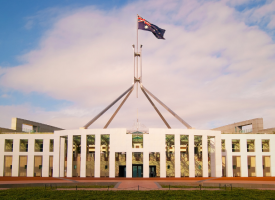Transcript - Dr Gannon - 4CA - Flu vaccinations
Transcript: AMA President, Dr Michael Gannon, 4CA, Mornings with John Mackenzie, Wednesday 11 April 2018
Subject: Flu vaccinations
JOHN MACKENZIE: Well, this flu business, there's a lot of concern about it. Already there are cases all over the place. This was yesterday's Courier Mail: Queensland's 2017 flu season looking set to be dwarfed this year with the debilitating disease having already struck down - listen to this - 3242 people. That's those that have been obviously reporting in, 300 more than at this time last year. It's the worst start to a year since 2008, with more than 36 people diagnosed each day.
Then you pick up today's Courier Mail, it says, a flu strain, a flu strain that originated in Brisbane is considered one of the most dangerous in the world this year. Following the recommendations from the World Health Organisation, the killer influenza B bug, dubbed the Brisbane virus, is included in this season's four-strain vaccination.
Look, it can be confusing. You might have gone down the last few days and, if you're over 65, then the doctor would have said, oh hang on a minute, you've got to get the stronger version, and the stronger version hasn't arrived yet. If you're under 65, there is a strain or there is rather a vaccine that is available immediately. But I think you've still got to get on the queue for, I think, two, three, four weeks, if you're over 65, and you want the stronger version of the vaccine.
I've put a call through to Dr Michael Gannon; he's quoted in this particular article. He's the President of the Australian Medical Association and he said this: “Brisbane's been given the unenviable honour of being named in the vaccine this year, not really something to celebrate, this is a killer, this flu, and thanks to its never-ending ability to mutate, it's likely it will remain a threat forever”. Michael's on the line.
Hello, Michael.
MICHAEL GANNON: Good morning, how are you?
JOHN MACKENZIE: This is an interesting one we've got, actually, this particular strain of flu named after the City of Brisbane.
MICHAEL GANNON: Yes, I'm not surprised there's a fascination that the - this year's taxonomy is named the capital of the great State of Queensland and that, you know, this adds to the fascination. But the truth is that flu is always a danger. It continues to infect, you know, literally tens of thousands of people each year. Some of them die and we're always on the lookout for that super flu season, you know, the next pandemic, which will claim many more lives than usual. We must be ever vigilant.
JOHN MACKENZIE: Now this particular- this year's strain, how bad is it?
MICHAEL GANNON: Well, the truth is we don't know, and every year, it sometimes appeals to someone to say we're particularly worried about this year's flu season. We certainly look at the previous northern hemisphere winter flu season for a guide as to what it might be like and, of course, that's where the vaccine is derived from.
We are constantly trying to get as much value for money out of the very, very expensive program that is the seasonal influenza vaccination program and year on year we look at, you know, what's worked in the past, what might work in the future. And you referred to the fact that last year was a particularly bad season in Queensland. And spring was bad. So, two of the changes to this year's program: one is the stronger vaccine for the over-65s, and certainly the other one is to roll the national program out just that little bit later to try and get maximum reward for effort.
JOHN MACKENZIE: Oh, that's interesting. Okay, so there is a greater threat obviously later in the season than at this stage. Is that what you're saying?
MICHAEL GANNON: Well we saw both in Queensland and Victoria particularly last year, a particularly nasty second peak in spring. So July and August are traditionally the peak months for influenza notification. You're quite right, the Health Department gets notifications about flu all 12 months of the year and that's because people are travelling. So they might catch it on a plane, they might have caught it on a holiday in Europe or North America and they're not being diagnosed until they got back. So it's - it can happen at any time of the year.
I'm on the radio, in newspapers, telling people to wait for the National Immunisation Program. We're expecting the vaccine probably in the first day or so of May, but I'm going overseas next week, so I'm going to get in early. So, we've got to individualise care. But I think the important message is, for those healthy individuals who aren't entitled to free flu vaccine, is why not wait until when we're recommending that the most vulnerable people in the community are vaccinated, that's the time where we think we get the greatest reward for effort as an individual, and certainly as part of the population.
JOHN MACKENZIE: You say something interesting in the Courier Mail today. You say: this year I will have my 30th - my 30th influenza vaccine. Regular injections, you say, help to keep on top of the mutating viruses. You're saying, where possible, go and get your needle every year.
MICHAEL GANNON: Yeah, there's some pretty good evidence for that, to show that people who have turned up year on year are afforded greater protection. And I can assure you, I'm no expert virologist or epidemiologist, but it is plausible that the constant mutation of the virus, it could change to a form similar to what it's looked like in the past. But what is undeniable is the people who have been vaccinated on a regular basis, over a more than 10-year period, are less likely to get the influenza in any single year.
JOHN MACKENZIE: Now, just can I get a better understanding of what's going on with what's available now, and the vaccine that will become available in the next week or two for those 65 years and over?
MICHAEL GANNON: So there's a total of, I think it's six, it might be seven, influenza vaccines that have been licensed by the TGA this year. Two of those are extra potency vaccines for the over 65s. So we saw last year, again, Australia wide, but particularly there was a couple of really nasty outbreaks in nursing homes in Victoria where there were a large number of deaths in elderly people.
So what they've done this year is the Health Department has licensed two vaccines that are augmented in two different ways. We don't express a preference for one over the other, but for want of a simpler term, they're stronger vaccines for the over 65s.
The National Immunisation Program or the seasonal influenza program for at-risk groups, so pregnant women, Aboriginal and Torres Strait Islanders, people over the age of 65, those with chronic disease, et cetera, we're expecting that to roll out right at the end of April, maybe the first week of May. So that vaccine's not available.
Of course there is vaccine available in some general practises and certainly in plenty of pharmacies. So I've just given the example, I'm travelling to the northern hemisphere next week, so I'm going to get in early. But my advice to most patients would be, because we're observing a wane in the effectiveness of the vaccine month on month, because we're really worried about July, August, but we want to still see you protected into September, waiting until the first half of May is appropriate for most people.
JOHN MACKENZIE: This has been very interesting. Thank you, Michael.
MICHAEL GANNON: It's been a pleasure.
JOHN MACKENZIE: Dr Michal Gannon, President of the Australian Medical Association and that article I was just quoting from in today's Courier Mail.
11 April 2018
CONTACT: John Flannery 02 6270 5477 / 0419 494 761
Maria Hawthorne 02 6270 5478 / 0427 209 753
Follow the AMA Media on Twitter: http://twitter.com/ama_media
Follow the AMA President on Twitter: http://twitter.com/amapresident
Follow Australian Medicine on Twitter: https://twitter.com/amaausmed
Like the AMA on Facebook https://www.facebook.com/AustralianMedicalAssociation



